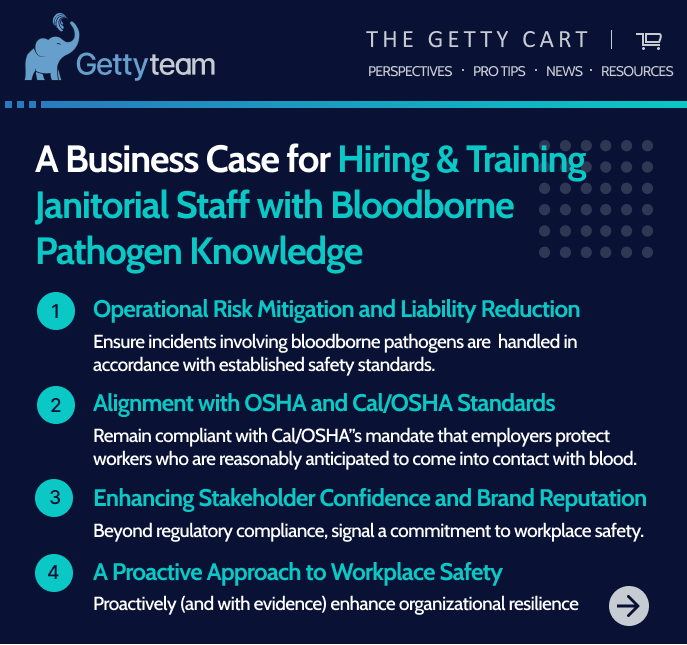Maintaining a safe and healthy workplace is a foundational responsibility for organizations across industries, including corporate offices, healthcare facilities, educational institutions, and public spaces.
Janitorial services are integral to this responsibility, serving as the first line of defense against potential health hazards. Among the most critical competencies for these professionals is bloodborne pathogen (BBP) knowledge.
The Business Case for Bloodborne Pathogen Certification
Bloodborne pathogens such as HIV, Hepatitis B (HBV), and Hepatitis C (HCV) pose significant health risks when transmitted through contact with infected blood or certain bodily fluids.
In environments where accidents or routine incidents occur, janitorial staff may encounter contaminated materials. Staff equipped with BBP certification have the knowledge and training to mitigate exposure risk and prevent cross-contamination, ensuring both employee safety and organizational continuity.
Key areas of BBP training include:
- Pathogen transmission and risk awareness.
- Proper use and management of personal protective equipment (PPE).
- Safe cleanup, handling, and disposal of contaminated materials.
- Hand hygiene and decontamination protocols.
- Compliance with federal and state regulations regarding biohazardous waste.
Operational Risk Mitigation and Liability Reduction
Hiring professional janitorial services with BBP certification enhances an organization’s risk management strategy. Certified personnel ensure that incidents involving bloodborne pathogens are handled in accordance with established safety standards, reducing the potential for workplace exposure, OSHA violations, and costly litigation. By proactively incorporating BBP-certified staff, organizations demonstrate due diligence and protect both employees and stakeholders.
Alignment with OSHA and Cal/OSHA Standards
The Occupational Safety and Health Administration (OSHA) mandates that employers protect workers who are reasonably anticipated to come into contact with blood or other potentially infectious materials. Similarly, California’s Cal/OSHA Title 8 § 5194 requires adherence to state-specific standards. Hiring BBP-certified janitorial staff ensures that organizations remain in full compliance with both federal and state regulatory frameworks, mitigating the risk of fines and enforcement actions.
Enhancing Stakeholder Confidence and Brand Reputation
Beyond regulatory compliance, employing BBP-certified janitorial teams signals a
commitment to workplace safety and operational excellence.
Employees, clients, and visitors are reassured that the organization prioritizes health and safety at every operational level.
This is particularly critical in high-risk environments such as:
- Healthcare and clinical facilities
- Educational institutions
- Fitness and recreation centers
- Public transportation hubs
- Hospitality and food service establishments
A Proactive Approach to Workplace Safety
Investment in BBP certification is not merely a training expense; it is a strategic decision that enhances organizational resilience. The cost of certification is modest relative to the potential consequences of exposure incidents, including OSHA investigations, legal action, and reputational harm. By hiring BBP-certified janitorial staff, organizations adopt a proactive, evidence-based approach to workplace safety.
Conclusion
Prioritizing the training (and/or hiring) of janitorial staff with bloodborne pathogen knowledge and certification is a proactive measure and investment. It strengthens compliance, mitigates operational risk, and reinforces organizational credibility.
In an era of heightened health and safety awareness, BBP-certified janitorial services reflect a commitment to best-in-class standards and responsible corporate stewardship.


